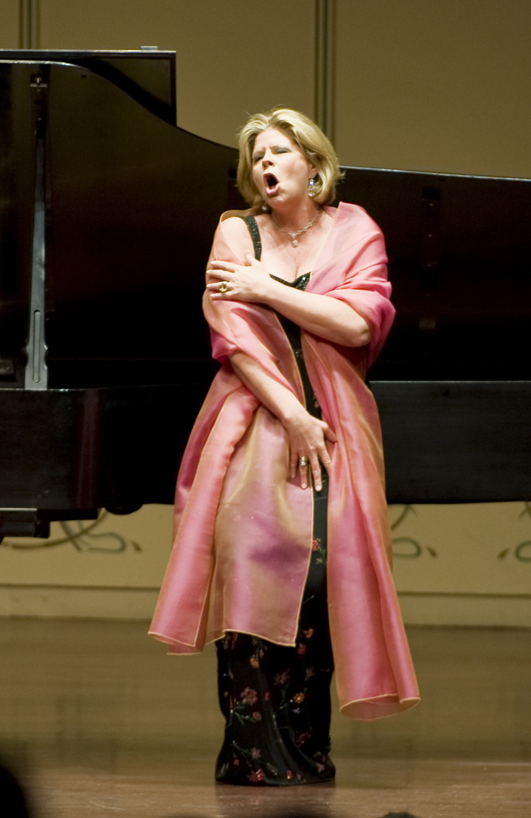Susan Graham engages the head and the heart with a century of French song

All those who believe—and such people do exist—that the vocal recital is going the way of responsible government spending should have attended Susan Graham’s recital Monday night at Ravinia.
The personality-plus mezzo-soprano served up a generous, uncommonly thoughtful program of two-dozen French songs spanning a century from Gounod to Poulenc, which proved an ideal showcase for Graham’s vocal artistry.
To call a recital educational sounds like faint praise, but Graham’s program at the Martin Theater was as enlightening as it was captivating. With pianist Brian Zeger an equal partner, the evening largely replicated Graham’s 2008 CD, Un frisson francais (Onyx), offering an historical survey that demonstrated the variety and richness of the French chanson, beyond the dreamy languor that has come to characterize the genre in most people’s minds. Even informed melodie devotees are likely to count songs by Pierre Bachelet and Emile Paladilhe as discoveries.
With the evening divided into 19th- and 20th century songs—two skillfully chosen groups each—Graham demonstrated the qualities that make her such a leading exponent of this repertoire: exquisite French pronunciation, a nuanced rubato and sense of the long line, and a creamy high mezzo even throughout its range, with daunting reserves of power.
The Texas-born singer’s engaging wit and winning un-diva informality was consistently delightful as well. When a staccato cell phone rang twice—appropriately just after Chabrier’s Les cigales (The cicadas)—she good-naturedly asked, “Is that for me?”
The 19th-century first half was especially inspired. Graham led off with a vivacious rendering of Bizet’s Chanson d’avril, following with a rapt performance of Franck’s Nocturne. She delivered the impetuous rhapsodic line of Faure’s Dans les ruines d’une abbaye as surely as her vividly characterized take on Saint-Saens’ Danse macabre.
But even with the manifest charm of the lighter selections like Chausson’s Les papillons, it was the lesser known songs that proved most intriguing. Graham provided sterling advocacy for Palidilhe with a deeply felt rendering of his Psyche, as well as Bachelet with the lovely Chere nuit.
The second half’s opening group allowed Graham’s humor to shine forth with several settings speaking ruefully and sardonically of relationships and infidelity from Ravel, Caplet and Roussel. Yet throughout the program, the singer also plumbed the deeper emotions, as with a starkly dramatic rendition of Duparc’s ever-timely anti-war meditation Au pays ou se fait la guerre.
Other highlights included Debussy’s Colloque sentimental, suffused with wistful longing, an affecting rendition of Reynaldo Hahn’s Tyndaris, and a sweetly soothing rendering of Canteloube’s lullaby, Breizarola. The program was rounded off with Poulenc’s extended La dame de Monte-Carlo. The Cocteau text tells of a lonely woman’s desperate drunken spree, and Graham’s performance captured the delicate balance between mild comic absurdity and deep sadness with consummate skill.
Pianist Zeger provided keyboard artistry on a comparable level throughout the evening. Encores kept to the Gallic motif with a heart-stoppingly beautiful performance of Hahn’s A Chloris and a sassy cabaret closer of Piaf’s La vie en rose.
Posted in Performances

